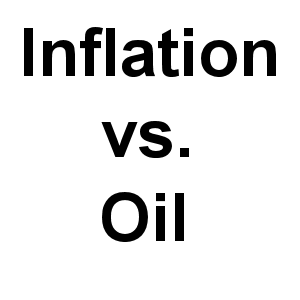For a very long time, the prices of oil and inflation have been closely related to each other. When the value of the precious black liquid goes up, inflation follows in the same direction. The reason for this is because oil is a major commodity that’s linked to a lot of things. Oil is used to heat homes, power public utilities, as well as run factories it is also a direct component in things like plastics. That being said, if the input cost for oil rises, so will the costs of finished products and services.
The direct association between oil and inflation was first recorded in the 70s. It was at the time when the cost per barrel rose from $3 in 1973 to $40 in the 1979 oil crisis. This allowed the Consumer Price Index (CPI) — the primary measurement of price inflation — to double from 41.20 to 86.30 in 1980. Because of the major influence of oil, the Bureau of Labor Statistics began publishing a version of the Consumer Price Index (CPI) both with and without energy so those who were interested in comparing could see the effects of oil price increases as a separate index. See What is Core Inflation and Why Doesn’t It Include Food and Energy? for more information.
 However, the direct relationship between oil and inflation today isn’t as strong as it was in the 70s. While still directly correlated, the relationship weakened during the Gulf War oil crisis. At that time, crude oil prices doubled in just 6 months. However, the CPI remained fairly steady. The disconnect in the correlation was even more clear during the oil price run up from 1999 to 2005 when the annual average nominal price for oil rose from $16.56 to $50.04 (i.e. roughly tripling). If there was a direct correlation you would expect the CPI to also triple.
However, the direct relationship between oil and inflation today isn’t as strong as it was in the 70s. While still directly correlated, the relationship weakened during the Gulf War oil crisis. At that time, crude oil prices doubled in just 6 months. However, the CPI remained fairly steady. The disconnect in the correlation was even more clear during the oil price run up from 1999 to 2005 when the annual average nominal price for oil rose from $16.56 to $50.04 (i.e. roughly tripling). If there was a direct correlation you would expect the CPI to also triple.
However, during the same time frame, the CPI rose from 164.30 in January 1999 to 196.80 in December 2005 (a less than 20% increase). With this data, it seems that the strong relationship between oil prices and inflation has significantly weakened.
In the middle of 2014, the prices of oil per barrel began to decline, and a study by economists Alejandro Badel and Joseph McGillicuddy conducted for the Federal Reserve Bank of St Louis revealed what could potentially simulate the oil/inflation scenario.
The study undertaken by Badel and McGillicuddy confirms that fluctuating oil prices don’t affect inflation as much anymore. Although oil prices were declining in the final months of 2015, inflation in the U.S. alone was actually increasing. In January 2016 when oil prices settled at $28 per barrel, inflation went down by 1% in February from 1.4% in the previous month.
As prices increased and further stabilized in 2016, there was only a 0.1% deviance from an inflation rate of 1% between February and June. Inflation went down to 0.8% in July, while oil prices bounced back in August due to talks about a potential reduction in the manufacturing of oil. During the rebound, oil climbed to $51 per barrel in August, before inflation in September confirmed a price increase of up to 1.5%. See: Our Oil Prices in Inflation Adjusted Terms Chart.
More recently, Nadex states that “Crude Oil just had it’s largest weekly up move since a 4.7% move the week of September 11th” reaching $59.05 which was oil’s highest price point since June 26. Even though it failed to reach the $60 price mark, it closed the week on a high note at $58.97.
Other studies about the effect of oil prices on inflation suggest that there is only a little “pass-through” of oil prices to inflation. For example, in a 2009 study by economist Shiu-Sheng Chen titled ‘Oil Price Pass-Through into Inflation,’ it was estimated that a 50% cut in oil prices would lessen the overall price level by less than 0.19%, which is far less than the change implied by financial markets when inflation is taken into account. There are different things that affect inflation now, and, while oil still affects it, the commodity seems to be a much smaller component than previously was the case.
You might also like:
- Inflation Adjusted Gasoline Prices
- Historical Oil Prices Chart
- Historical Crude Oil Prices (Table)
- Inflation Adjusted Natural Gas Prices
- Inflation Rate of Electricity Prices


Leave a Reply